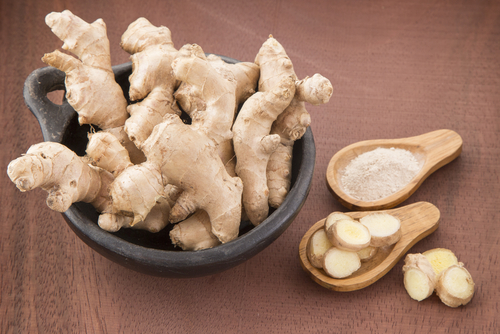Food as Medicine – The Health Benefits of Ginger
As I prepare for the departure of a trip to India in two days, my taste buds are already anticipating the delicious and distinctive flavours of this fascinating country. Spices are an integral part of Indian cuisine, including the standouts of turmeric, galangal, cardamom, and, of course, ginger.
In addition to their delicious and unique tastes, these spices figure amongst those with clear and distinct medicinal properties, as well. Ayurvedic medicine, which originated in India, has used spices as healing implements for a plethora of diseases and disorders for over 5,000 years.
Originating from China, ginger is now a commonly found and used food element around the world, and has a long history in traditional/alternative medicine. It is high in a substance known as gingerol, which has powerful antioxidant and anti-inflammatory properties. Ginger is known to have positive effects for digestion, reducing nausea, and fighting ailments, such as the common cold and flu, just to name a few. Other positive effects are: minimising muscle pain and exercise-related muscle soreness, lowering blood sugar as well as potential heart disease issues, including those related to type-2 diabetes, reducing LDL cholesterol levels, and possibly offering anti-cancer properties. Ginger is also thought to improve brain function and offer some resistance and prevention to the onset of Alzheimer’s disease.
My personal experience has shown me that ginger is a highly effective, natural way to boost one’s immune system and provide greater resistance to the accumulation of disease-inducing toxins. This ultimately makes perfect sense, as the seat of the immune system lies in the digestive tract. Through the increased, happier digestion, which ginger enhances– hence, more effective absorption of nutrients – an increase in immune system activity is a superb by-product, thus reducing the risk of both bacterial and fungal infections, as well as excess residue as a result of poor digestion.
My travel schedule is extensive, and includes dozens of international flights each year. The internally circulating air in the plane can be a fertile hotbed for the germs, colds, and other volatile infectious elements, which various passengers inevitably and unknowingly (or not) carry with them and breathe into the unsuspecting lungs of their fellow travellers. I have been fortunate enough to not be stricken with the common ailments that befall many travellers. I chalk this up to the inclusion of ginger as a staple element of my nutritional regimen, and the increase to my immune system, which ginger provides.
A small, relatively inexpensive segment of ginger root can be a tasty and worthwhile health companion. A few slices of ginger root in hot water can act as a cleansing, strengthening infusion. Ground, powdered, or fresh ginger added to rice or vegetable dishes add both enhanced flavour as well as a sprinkling of preventative medicine to any chosen meal. This natural and delicious addition to your health regimen may just become a flavour for which your taste buds, and the rest of your body, will be yearning.
Well-being starts with prevention, thus reducing the need for treatment. Ginger might just be one of the simplest, most positive medicines that you can offer your body.


